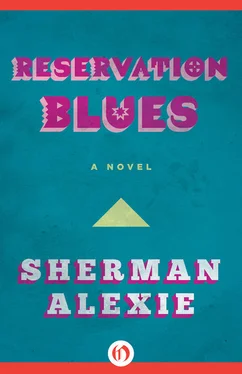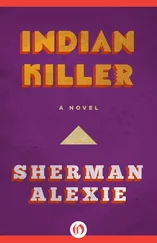Checkers climbed quietly into the van.
“Goodbye,” Big Mom said. “You can always come back.”
Robert Johnson pulled out his harmonica and blew a few chords. The-man-who-was-probably-Lakota played along on his hand drum. The blue van pulled away.
“The end of the world is near! The end of the world is near!”
They drove away from the Spokane Indian Reservation in silence, Chess, Thomas, and Checkers all struggling with the silence and wanting to find something to say. They smiled at each other and tried to read each other’s mind. Chess could feel Thomas and Checkers trying to read her mind, but she wouldn’t let them in. She tried to read their minds, but they wouldn’t let her in. What were they all thinking? What did they think was going to happen in Spokane? Would Thomas be ignored in the city, would those Urban Indians try to hurt him? Would some friend of David WalksAlong or Michael White Hawk come running out of the crowd with a knife, a gun, or a razor-sharp piece of a broken dream? Was Checkers still thinking about Father Arnold? Did she think she’d come running back to the reservation? And what about Victor? Would he still be trying to drink himself to death when he was eighty years old, a complete failure at everything he ever did?
“I’m scared,” Chess said to Thomas.
“Chess,” he said, “we’re all scared.”
They all held their breath as they drove over the reservation border. Nothing happened. No locks clicked shut behind them. No voices spoke, although the wind moved through the pine trees. It was dark. There were shadows. Those shadows took shape, became horses running alongside the van.
Chess, Checkers, and Thomas all looked at each other with fear and wonder. A shadow horse was running so close to the van that Chess could have reached out and touched it. Then she rolled down her window and reached out to touch that shadow, that horse. It was hot and wet. Checkers reached out of her window and touched a horse of her own, while Thomas drove the van, illuminating more shadows galloping down the road in front of them.
Those horses were following, leading Indians toward the city, while other Indians were traditional dancing in the Longhouse after the feast, while drunk Indians stood outside the Trading Post, drinking and laughing. Robert Johnson and the-man-who-was-probably-Lakota played a duet. Big Mom sat in her rocking chair, measuring time with her back and forth, back and forth, back and forth there on the Spokane Indian Reservation. She sang a protection song, so none of the Indians, not one, would forget who they are.
In a dream, Chess, Checkers, and Thomas sat at the drum with Big Mom during the powwow. All the Spokane Indians crowded around the drum, too. They all pounded the drum and sang. Big Mom taught them a new song, the shadow horses’ song, the slaughtered horses’ song, the screaming horses’ song, a song of mourning that would become a song of celebration: we have survived, we have survived. They would sing and sing, until Big Mom pulled out that flute built of the bones of the most beautiful horse who ever lived. She’d play a note, then two, three, then nine hundred. One for each of the dead horses. Then she’d keep playing, nine hundred, nine thousand, nine million, one note for each of the dead Indians.
In the blue van, Thomas, Chess, and Checkers sang together. They were alive; they’d keep living. They sang together with the shadow horses: we are alive, we’ll keep living. Songs were waiting for them up there in the dark. Songs were waiting for them in the city. Thomas drove the car through the dark. He drove. Checkers and Chess reached out of their windows and held tightly to the manes of those shadow horses running alongside the blue van.
WITH THANKS TO DONNA Brook, David James Duncan, and Dick Lourie for their editorial help, and Nancy Stauffer for her continued support and friendship. Special thanks to Jim Boyd, my Colville Indian songwriting partner. I want to acknowledge Christiane Bird’s The Jazz and Blues Lover’s Guide to the U.S., Carl P. Schlicke’s General George Wright: Guardian of the Pacific Coast, Benjamin Manning’s Conquest of the Coeur d’Alenes, Spokanes, & Palouses, Robert H. Ruby’s and John A. Brown’s The Spokane Indians: Children of the Sun, and Mari Sandoz’s Crazy Horse: The Strange Man of the Oglalas for valuable historical material. I want to especially acknowledge the influence of the Columbia Pictures film Crossroads, directed by Walter Hill and written by John Fusco, which was released to a very quiet reception in 1985. Most of all, I want to honor the memory of the real Robert Johnson. Without his music, none of the music contained in this book would exist.












